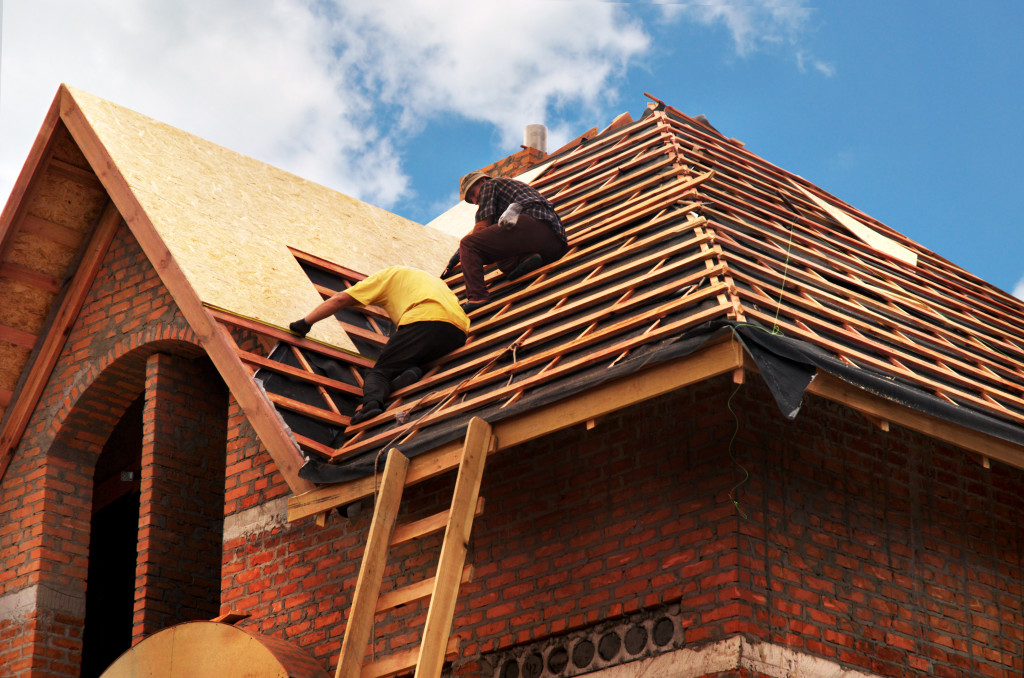- Get professional advice from experienced professionals and consultants.
- Invest in high-quality materials such as steel, reinforced concrete, metal roofing, and insulation.
- Take your time when researching building materials, designs and layouts.
- Set a realistic budget before beginning your home project.
- Find reliable contractors with extensive experience and good references.
Building your own home is a big undertaking. It requires careful planning, research and organization to ensure that the project runs as smoothly as possible. With that in mind, here are five useful tips to help you get started on this exciting journey.
1. Get Professional Advice
When building your own home, getting professional advice from an experienced architect or builder is crucial. Ensure they have a good track record in designing and constructing custom-built homes. A professional can provide valuable insights into structural integrity, design elements and cost savings.
They can also help you plan the project effectively to ensure everything runs smoothly throughout the process. Engaging self build planning consultants early on can help you avoid any costly bumps down the road. These consultants can provide expert advice on building regulations and other planning issues that may arise during the project.
2. Choose High-Quality Materials
High-quality materials are essential if you want the end result of your home building project to look its best. Choosing high-grade materials such as stone, brick, or wood will make your home look better and last longer and help you save money in the long run.
Here are just some materials you should consider investing in:
Structural Materials
Regarding structural materials, high-grade steel or reinforced concrete is an ideal option. Steel is strong and durable, while reinforced concrete can provide additional strength and stability in areas prone to heavy loads. These materials will help ensure that your home is structurally sound and make it more energy efficient by reducing heat loss through the walls and flooring.
Roofing Materials

Good quality roofing material is essential for protecting your home against the elements. Metal roofing is a popular choice among homeowners due to its low maintenance requirements, durability and fire resistance properties. Also, metal roofing can reflect sunlight, which helps reduce cooling costs in hot climates. Alternatively, you may opt for traditional tile or slate roofing, which adds texture and character to your home’s exterior.
Insulation Materials
Insulation is an important component of a well-built home. A variety of insulation materials are available on the market, such as foam board, fiberglass batts, and spray foam insulation. Each type has its benefits, so it’s important to research which material would best suit your particular needs. Also, proper installation guidelines must be followed when installing insulation materials to achieve optimal results.
Finishing Materials
The finishing touches can make all the difference when it comes to how your home looks and feels after construction is complete. Wallpapers, paints and tiles are just some materials you can use to give your home personality. High-grade wood flooring is also an excellent choice as it is durable, easy to clean and adds a touch of sophistication to any home.
3. Plan Ahead
When it comes to building your own home, planning is vital. Research your preferred building materials, designs and layouts before making decisions. Consider the location of your property and its surroundings when designing, as this will impact how much light or shade there is, how windy it gets etc. Make sure local authorities approve all plans before starting any construction work.
You should stay organized while planning, as this will help you stay on track and avoid any unnecessary delays. Any paperwork accomplished ahead of time, such as permits and other legal documents, should be organized in one place. Blueprints and sketches of your proposed house should also be drawn up and kept on hand for easy reference.
4. Set a Realistic Budget

Building your own home is a major investment, so you must set a realistic budget before beginning the project. Start by estimating all expenses, such as labor costs, building materials and furniture. Research prices online or talk to industry professionals to better understand how much your project will cost.
Making sure to stick to the budget is just as important. If extra costs arise due to unexpected setbacks, account for them in the overall budget. If necessary, you should also be prepared to compromise on some aspects to ensure your project stays within its set financial limits.
5. Find the Right Contractors
Finding the right contractors is essential for any successful home-building project. Look for those with extensive experience working on similar projects and ensure they have a solid reputation within their field. Ask to see references from previous clients to get an idea of their quality of work before hiring them. It is also essential to ask questions about their availability and payment terms before agreeing on anything.
To Wrap Things Up
Building your own home can be daunting, but with the proper knowledge, resources and preparation, it can be a rewarding experience that will allow you to create your perfect home. Following the above tips ensures your project runs smoothly and is completed to a high standard.
